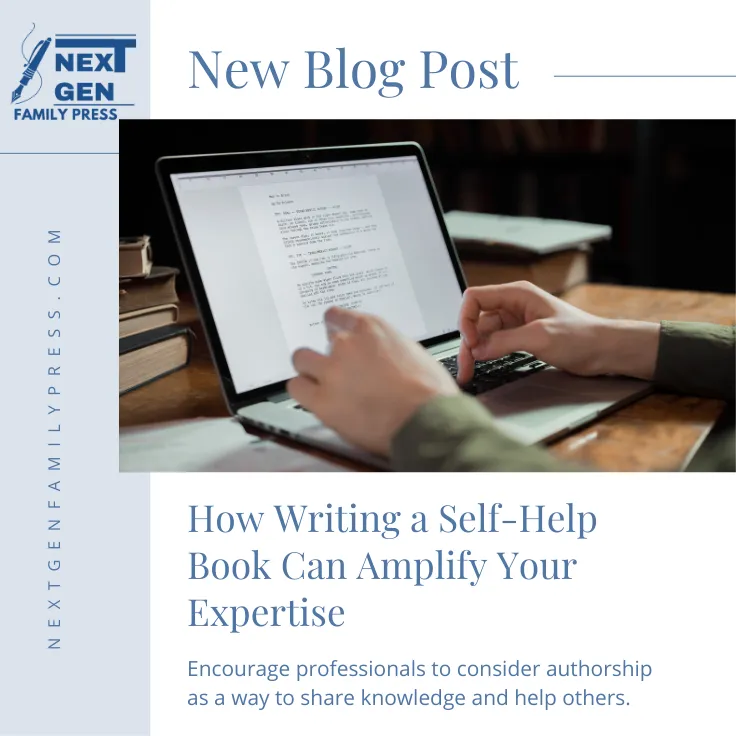
How Writing a Self-Help Book Can Amplify Your Expertise
Encourage professionals to consider authorship as a way to share knowledge and help others.
In a world overflowing with information, how do you stand out as a true expert in your field? How do you move beyond the noise and build a legacy of impact?
One powerful yet often overlooked path is writing a self-help book.
Far from being just a vanity project, authoring a self-help book is a strategic, transformative way to share your knowledge, build trust, and expand your influence—while helping others navigate challenges and grow.
If you’re a professional with deep insights and a genuine desire to make a difference, writing a book is more than a career milestone—it’s a catalyst for meaningful connection and credibility.
1. Position Yourself as a Trusted Authority
When you publish a self-help book, you don’t just share information—you demonstrate mastery.
Books carry weight. They are tangible proof of your expertise. They say, “I’ve taken the time to think deeply, research thoroughly, and package my knowledge in a way that others can benefit from.”
As bestselling author and leadership expert Robin Sharma notes,
“Writing a book is the ultimate way to establish your authority and amplify your voice.”
A book can open doors: speaking engagements, consulting opportunities, collaborations—all built on the foundation of trust that a published work creates.
2. Extend Your Reach Beyond One-on-One
In many professions, sharing wisdom happens in intimate settings—meetings, coaching sessions, workshops. While impactful, this one-to-one or small group approach limits the number of people you can help at a time.
A book breaks those limits.
It is a vehicle to reach thousands, even millions, across geographies and time zones. Your message lives long after the final page is written.
As author and entrepreneur Seth Godin says,
“A book is a shortcut to a shared understanding. It helps us speak the same language.”
Through your words, you cultivate a community of readers who see you as a guide, mentor, and trusted source.
3. Clarify and Solidify Your Ideas
Writing forces clarity.
When you write a self-help book, you distill your years of experience and knowledge into digestible concepts, actionable steps, and relatable stories. This process sharpens your thinking and often leads to new insights.
Stephen King, an author known for his craft as much as his creativity, famously said,
“To write is human, to edit is divine.”
The act of writing—and rewriting—allows you to refine your message until it truly resonates.
This clarity not only benefits your readers but also enhances your own professional confidence and communication skills.
4. Create a Legacy of Impact
A book is more than a marketing tool—it’s a lasting contribution.
Unlike fleeting social media posts or temporary workshops, a well-crafted self-help book remains accessible for years, guiding readers through their challenges and transformations.
Think of your book as a seed planted in the minds of those who need your voice most.
As author Maya Angelou put it,
“Try to be a rainbow in someone’s cloud.”
Your book can be that rainbow—a source of light and hope for people striving to improve their lives.
5. Open New Opportunities for Growth
Writing a book often leads to unexpected doors opening.
Media interviews, podcast invitations, partnerships, and even new business ventures frequently emerge once you step into the role of author.
In sharing your expertise through a self-help book, you position yourself not just as an expert, but as a thought leader and influencer.
It’s a bold move that says:
“I’m ready to lead—and help others lead—toward better, more fulfilling lives.”
Final Thoughts: Your Story, Your Wisdom, Your Gift
Every professional has knowledge and experience that can uplift others. Writing a self-help book is the ultimate way to share that wisdom in a form that is accessible, enduring, and transformative.
If you’ve ever considered putting pen to paper—whether it’s to solve a problem you’ve witnessed repeatedly, to distill hard-won lessons, or to inspire action—now is the time.
Your book can become the bridge between where people are struggling and where they want to be. It can amplify your voice, your impact, and your legacy.